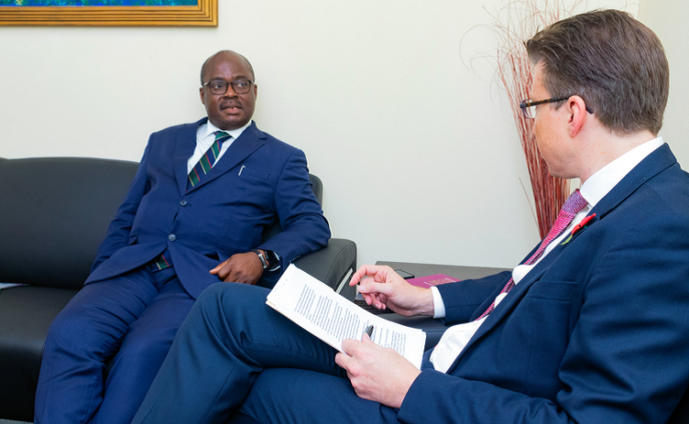The Governor of the Bank of Ghana, Dr. Ernest Addison, has warned that Ghana does not have a choice but to manage a tight fiscal consolidation in an election year.
According to him, the lessons of the economic crisis are fresh on everybody’s mind, and therefore there is the need to keep the currency stable going into the election
Speaking in an interview with Christopher Jeffery of centralbanking.com at the ECCB 40th anniversary and Central Banking Autumn meetings in Saint Kitts and Nevis, he said the central banking financing of the government will remain zero unless otherwise.
“Ghana doesn’t have a choice but to do so, because we have all seen what an economic crisis can do. The lessons are fresh on everybody’s mind. And the need to keep the currency stable is paramount going into the election”.
On independence of the central bank, he said central bank independence is relative, noting, “We have acted independently for most of the time that I have been in office”.
He added “I have not had to consult anybody to set interest rates. The Bank of Ghana is relatively independent. We have an inflation-targeting framework. We have a Monetary Policy Committee that sets interest rates. Independence is all about operational independence. Once you have the structures and the tools to do that, you are there”.
Domestic Debt Exchange Programme
Regarding the Domestic Debt Exchange Programme, the Governor was unhappy the Bank of Ghana took 50% of the haircut, saying, it raise the matter with the International Monetary Fund.
“We were not. We did raise the matter with the IMF. The IMF brought in central bank balance sheet experts to look at our accounts who, by the time they were done, were of the view that despite the haircut, we were policy solvent and we could still operate”.
He said the issue of reviewing the central bank’s accounts would have to be revisited in another three years, adding, “Obviously, this was a time we needed to make progress to ensure the Fund’s board meeting took place. The central bank had become almost the last obstacle to getting Ghana’s programme approved by the IMF. Therefore, it was difficult to spend too much time on further discussions”.
He mentioned that the other parties – pensions funds – were not much affected, adding, “I think they got off relatively easier than they would have if the initial permutations had been followed. We had to take an additional haircut because of that – from 35% to 50%”.
Latest Stories
-
The stirring you can’t ignore: 3 signs God is calling you into more
2 minutes -
Mahama has demonstrated the will to fight galamsey – Shamima Muslim
14 minutes -
6 months enough for Mahama to end galamsey – Prof. Bokpin
16 minutes -
Eric Asiedu Boadi: Pupil teacher who broke age-old voodoo to become broadcasting powerhouse
21 minutes -
Galamsey: Repeal LI 2462 as you promised – Osae Kwapong to Mahama
24 minutes -
Mahama has turned bis back on Ghanaians in galamsey fight – Haruna Mohammed
30 minutes -
Mahama gov’t lacks gravitas to tackle Galamsey – Haruna Mohammed
40 minutes -
Prof Bokpin urges Mahama to apply strong leadership to Galamsey fight
43 minutes -
The biggest threat to Ghana’s economic survival is irresponsible mining – Prof. Bokpin
54 minutes -
Government cracks down on galamsey with new initiatives, enforcement measures
1 hour -
Government seeks financial support from Diplomatic Community to fight illegal mining
2 hours -
Council of State Chairman urges MMDCEs to take responsibilities seriously
2 hours -
Banks must build trust to thrive in digital age
4 hours -
GTEC threatens revocation, legal action against ‘Dr’, ‘Prof’ title abusers
4 hours -
Ashigbey replies Chinese Ambassador over ‘galamsey’ comment
4 hours

